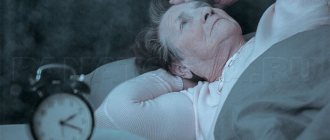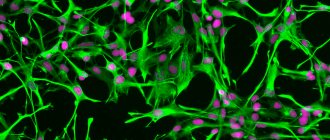Issues discussed in the material:
- What is senile dementia
- What types and degrees of disease exist?
- How to understand that the disease is progressing
- What treatments are there for dementia?
- How to care for an older person with dementia
Dementia of old age is a clinical syndrome characterized by loss of memory and other mental functions. It appears as a result of progressive chronic degenerative lesions of the brain. Dementia is expressed not only in disruption of thinking processes, but also in changes in behavior, up to personality degradation. The article examines the types of dementia, methods of treating it, as well as methods of caring for older people with this disease.
Why does senile dementia occur?
20 years is the age at which the natural process of loss of nerve cells begins. Therefore, a slight impairment of short-term memory is quite normal in all older people. A person begins to forget the names of recent acquaintances, places where he put things, etc. As a rule, problems in everyday life do not arise from this type of deviation. However, if dementia progresses in an elderly person, the distress will be much stronger.
The most common causes of pathology are:
- Alzheimer's disease (65% of all cases);
- impaired vascular function as a result of atherosclerosis, arterial hypertension, poor circulation and blood counts;
- alcohol and drugs;
- Parkinson's disease;
- Pick's disease;
- diabetes;
- head injuries;
- endocrine and autoimmune diseases;
- infectious diseases (AIDS, encephalitis, etc.);
- aggravated diseases of internal organs;
- severe renal and liver failure;
- consequences of the hemodialysis procedure.
Sometimes the progression of the disease in the elderly occurs due to several reasons at once (for example, in the classic senile (senile) mixed form of the disease).
Risk factors leading to the development of dementia:
- age 65 years and above;
- hypertonic disease;
- increased levels of lipids in the blood;
- obesity, as well as lack of physical activity.
- lack of mental activity for three years or more;
- low estrogen levels (only in older women).
We recommend
“Signs of senile dementia and ways to prolong mental health” Read more
Types of dementia in old age
According to the etiological factor, dementia can be:
- vascular,
- atrophic,
- mixed.
Depending on where the lesion is located, the following types of dementia in the elderly are distinguished:
- cortical (in the cortical centers of the brain);
- subcortical (basal ganglia, white matter, limbic system, etc.);
- cortical-subcortical;
- multifocal, accompanied by many foci of brain tissue damage.
Syndromic classification divides dementia into:
- total (changes are rough, pronounced);
- lacunar, or dysmnestic (occurs with milder symptoms).
Pseudodementia is distinguished separately. In this condition, cognitive functions sharply deteriorate due to existing psychiatric pathology (hysteroid psychopathy, depressive disorders).
Degrees of senile dementia
1. Early.
Since the disease progresses slowly, its symptoms are invisible to both the patient and relatives. Therefore, seeing a doctor is often late.
Clinic for early stage dementia in older people:
- forgetfulness;
- violation of the time count;
- disorientation in space, even in a familiar place.
2. Average.
Symptoms of the disease intensify:
- an elderly patient begins to forget what happened recently, in addition, he does not remember the names and faces of acquaintances;
- an elderly patient ceases to navigate even in his own home;
- communication becomes significantly more difficult;
- a person suffering from dementia is no longer able to take care of themselves without assistance;
- the elderly person's behavior worsens;
- for a long time the patient performs the same aimless actions or asks about the same thing several times.
3. Late.
The manifestation of dementia in old age at this stage is the onset of complete dependence of the patient on his relatives, who provide constant care for him. Main features:
- absolute disorientation in time and surrounding space;
- an elderly patient has difficulty recognizing relatives and friends;
- a person suffering from dementia needs constant care, as he cannot eat food on his own, as well as perform simple hygienic manipulations;
- behavioral disturbances intensify, the elderly patient becomes more and more aggressive.
We recommend
“Dementia in older people: symptoms and treatment” Read more
Senile amnesia - what is it?
Senile amnesia, forgetfulness, absent-mindedness are alarming symptoms of progressive dysfunction of the brain. Amnesia is accompanied by confusion and impaired memory recall of previously occurring events. The condition may be spontaneous, episodic or progressive. With short-term amnesia, older people retain knowledge of their name, family, remember current events, and are able to perform basic mathematical operations.
In the absence of attention to episodes of memory loss, amnesia progresses, especially if it is facilitated by a complicated clinical history (atherosclerosis, trauma or organic brain damage, stroke, oncology, severe metabolic disorders due to renal or liver failure).
Development of dementia as a factor in age-related forgetfulness
Dementia (dementia, senile forgetfulness) is a persistent irreversible disorder of the higher nervous activity of the brain and central nervous system, in which all previously acquired skills and knowledge are lost. Dementia in neurology is considered as the completion of the process of progressive amnesia in elderly people and the elderly. The pathological process can be a consequence of one or multiple factors that in one way or another affect the function of brain structures and tissues.
Today, more than 30 million people in the population suffer from dementia, the prevalence is determined by the age of the patient. According to statistics, a mild form of dementia is registered in 20% of cases, a severe form - in 5-7%. Clinicians predict an increase in patients with organic disorders of the central nervous system and brain function due to improved quality of medicine and the prevention of mortality even in severe brain pathologies or skull injuries.
Acquired dementia in the elderly is relevant in modern neurology due to its widespread prevalence among the population over 60 years of age. At the same time, the first signs were observed earlier, were expressed in the form of short-term amnesia and were ignored.
Alzheimer's disease
Alzheimer's disease is characterized by a selective or lacunar type of dementia. This is an atrophic senile type of dementia, the symptoms of which appear before the age of 60. The majority of cases are observed between the ages of 65 and 75 years. Alzheimer's disease can be inherited. Risks are reduced if you study music and foreign languages from early childhood.
This type of senile dementia can develop for the following reasons:
- getting injured;
- state of oxygen starvation of the brain;
- neurotoxin poisoning.
The disease develops as a result of a biochemical disorder of glucose metabolism, which leads to the formation of plaques consisting of poorly soluble protein. These plaques, deposited in the brain, contribute to degenerative changes in nerve cells. As a result, lesions form in the cerebral cortex, which can lead to total dementia.
How quickly does dementia progress in old age? At the onset of Alzheimer's disease, memory is impaired. The elderly man is slightly absent-minded and a little forgetful, which does not attract attention at first.
The environment begins to notice changes when a person constantly forgets even recently occurring events. Although the elderly patient remembers much earlier episodes from her life very well. But later they disappear too. A patient with Alzheimer's syndrome cannot recall necessary information at the right time.
The newly received information is practically not absorbed. Elderly people have impaired spatial and temporal orientation. They often start asking questions about what day of the week, date, month, year it is. The course of the disease worsens, and the person ceases to understand where he is and does not recognize himself in the mirror. In addition, visual and hearing disturbances appear, and tactile sensitivity is impaired. Older patients cease to correctly perceive acquaintances, relatives, and home environment. In the later stages of dementia, older people cannot adequately identify their own identity.
The practical sphere of activity is gradually degrading. The process begins with the loss of complex professional skills and ends with the complete disappearance of self-service skills.
At the very beginning of the development of the disease, the elderly person is animated and fussy. Then his fussiness turns into reflexive monotonous movements. Speech is gradually reduced.
Emotionally, an Alzheimer's patient develops egocentrism, dissatisfaction with himself and his inability to overcome difficulties in professional activities and studies.
First, the elderly patient realizes that abnormal abnormalities are occurring and tries to take action. As the disease progresses, the level of self-criticism decreases. At the same time, the circle of interests of an older person narrows significantly, his judgments become more primitive. Literally before our eyes, the elderly patient degrades emotionally, turning into a very distrustful, touchy and, finally, indifferent person.
We recommend
“Products for Alzheimer’s patients: dishes, clothing, gadgets, games” Read more
Types of memory disorders in older people
Medical statistics show that cases of sudden memory loss in older people have recently become more frequent. This happens completely unexpectedly; a person of advanced age simply forgets his name and address and does not recognize close relatives. Such memory disorders are being studied at the Moscow Serbsky Institute, but a technique has not yet been developed that completely restores mental activity.
It is known that memory loss in the elderly is associated with deterioration in the functioning of parts of the brain - the pituitary gland and the hypothalamus. Doctors say that the precursor to Alzheimer's disease is the neurological disease multiple sclerosis.
Energy in the pineal gland of the brain fades with age, so in the worst case, the memory is completely erased. Of course, there is also a positive scenario for the development of the disease, when it develops very slowly, barely noticeable, if the person does not aggravate his condition with bruises, head injuries and other factors.
Memory loss in older people is divided into types, which depend on the characteristics of the lost information:
- By prevalence. Loss of memories can be complete or partial;
- By time period - long-term or short-term;
- For forgotten events. There are anterograde and retrograde memory loss. In the first case, an elderly person completely forgets events from his past, but remembers what happens every day perfectly. Unfortunately, anterograde memory loss progresses over time towards complete loss of information about the past. In the case of retrograde brain disorder, the patient does not assimilate everyday events, but remembers what happened decades ago;
- By speed - the loss of memories occurs gradually or suddenly, which is associated with the natural wear and tear of the body;
- Global amnesia - an elderly person remembers absolutely nothing from his past and present. New events are also not stored in memory;
- Selective - individual events from past years appear in the memory of an older person;
- Visual - associated with visual perception, when an elderly relative ceases to recognize his loved ones. Sometimes enlightenment occurs when a person seems to remember someone, but definitely does not remember either the name or the significance of the person in his life;
- Reversible and irreversible;
There are several additional types of memory loss in which the body is affected by external factors, rather than changes in general condition:
1. Korsakov's loss occurs in people who abuse alcohol. During periods of severe hangover or intoxication, they tend to forget certain events.
2. Senile loss - develops gradually as a person ages. Usually the old people themselves may not notice this, but the interlocutor realizes that the main topic of conversation is increasingly becoming the events of bygone years.
3. Post-stroke memory loss, when the attack leaves an imprint on a person’s ability to see, hear, feel, think and remember information.
Amnesia is commonly referred to as complete or partial memory loss in older adults. It can be caused by completely different reasons. In combination with attention and thinking disorders in older age, it develops into senile dementia or dementia.
Disruption of thought processes significantly affects a person’s life. Over time, more and more information is forgotten. At the beginning, events are erased from memory in separate fragments.
Old people cannot remember whether they closed the door behind them, turned off electrical appliances, or took their medicine on time. Over time, the events of young and mature years do not emerge in memory, and after a certain period of time, the people surrounding the elderly person become strangers to him.
1. Short-term amnesia.
The pathology is mild in nature, manifested by some forgetfulness and is not recognized by the elderly as a dysfunction. Recent events, for example, from the past month, are erased from memory. But then the information pops up in my head again. If memory loss lasts daily in older people, you should definitely consult a doctor for recommendations. Otherwise, this uncomfortable state will cause stress and further weakening of the ability to remember. Therapy will help stabilize memory, and the patient will have no reason to get upset ahead of time. Early treatment will prevent symptoms from progressing, and healthy cognitive function will remain for many years.
2. Sudden memory loss.
This type of amnesia occurs suddenly, and the patient finds it difficult to carry out even basic household chores. A sharp loss of memory in older people manifests itself, for example, when a person left the entrance to go grocery shopping, and he suddenly forgot his goal and rushed to the nearest park. The reason for this may be pathologies in the brain or emotional experiences.
If close relatives do not take care of timely treatment and assistance for the elderly person, the disease can progress and become unsafe. Interruptions in mental activity worsen the quality of life, cause fear for the future and are met with misunderstanding from those around us.
3.Sudden amnesia.
The most complex case of the disorder, which is not diagnosed at the progression stage and is difficult to predict. An elderly person completely forgets everything that is important for his normal life - first name, last name, address, family members.
Such severe memory loss in older people makes it difficult to identify them, especially if they do not have a passport with them. Sudden amnesia explains the disappearance of pensioners when they cannot remember the location of their home and search the surrounding area without success. When asking them a question about their place of residence, random passers-by receive incomprehensible phrases in response, since the thoughts in their heads are also confused. If you are lucky, individual fragments of memories will appear, but there is usually no logic, and there is no single picture. If you find elderly people with memory loss, you should immediately contact a medical facility.
Competent therapy will help stabilize the condition, and the case of severe amnesia will be erased from consciousness.
We recommend
“Products for people with dementia that will make life more comfortable and safer” Read more
Vascular dementia
Of all types of senile dementia, 20% of cases are due to dementia of vascular origin. This species ranks second after Alzheimer's disease.
Dementia stands apart against the background of vascular accidents:
- hemorrhagic stroke, in which brain vessels rupture;
- ischemic stroke, during which blockage of blood vessels occurs and blood circulation in a specific area worsens or stops.
In these situations, brain cells die en masse, with focal symptoms most clearly manifested, which depend on the location of the affected areas. The clinical pictures of dementia after stroke are varied. It is important how severely the vessels are affected, what is the area of the blood supply to the areas of the brain. Much will depend on the compensatory capabilities of each individual organism. In case of vascular injury, timely and adequate medical care is of great importance.
Dementia of old age, resulting from chronic circulatory deficiency, occurs in a more homogeneous clinical picture.
We recommend
“Vascular dementia: symptoms, diagnosis and treatment methods” Read more
Senile dementia with Lewy bodies
This type refers to atrophic, degenerative processes, during which intracellular inclusions (Lewy bodies) are formed in the brain. What are the causes of this phenomenon and what are the mechanisms of its development, specialists do not know. Doctors note the important role of hereditary factors in the progression of pathology. This type of elderly dementia accounts for 15–20% of the total mass of senile disorders of the central nervous system.
Many symptoms of this type of pathology are similar to the manifestations of dementia described above. The most characteristic indicator is fluctuation, which consists of sudden disruptions in intellectual and mental activity. Doctors consider these deviations to be partially reversible.
With small forms of fluctuations, elderly patients experience a temporary inability to concentrate on anything specific (subject, object, task, as well as the process of solving it). If an elderly patient has large forms of fluctuation, he does not recognize objects, close people, and is not able to navigate the area.
Another distinctive characteristic of this type of dementia is auditory, visual, and sometimes taste and tactile hallucinations.
In addition, autonomic disorders are observed during the disease process:
- hypotension of the orthostatic type, in which an elderly patient’s blood pressure sharply decreases when changing body position;
- fainting, arrhythmia;
- disorders in the gastrointestinal tract, increased constipation, urination problems, etc.
Treatment of senile dementia with Lewy bodies is similar to that of Alzheimer's disease. If there are signs of confusion in an elderly patient, acetylcholinesterase inhibitors and sometimes atypical antipsychotics are prescribed.
Signs of dementia
Regardless of what type of disease the patient has, the complex of clinical manifestations of the disease is almost the same. When you first notice signs of dementia, you must urgently consult a doctor in order to make an accurate diagnosis and draw up a treatment algorithm.
Alarm bells that the patient’s relatives should pay attention to are the following factors:
- Impairment of short-term and long-term memory. It manifests itself in the form of an inability to remember new information or reproduce the events of the past day or past years. Patients make every effort to activate their memory, but they fail.
- The patient cannot fully assimilate new information or acquire skills that he did not have before. These people lose the ability to learn, cannot remember the sequence of actions and lose touch with reality.
- Disorientation in space. A person easily gets lost in open areas; he does not remember his residential address and telephone number. Sometimes he cannot clearly answer the question what day and year it is. Such elderly people are often brought to the police by vigilant citizens. Only law enforcement agencies can figure out where an elderly person comes from and where to look for his relatives.
- There is no desire to learn something new, since this information cannot be processed by the brain at the same level.
- The critical attitude towards oneself and one’s actions is lost, the patient ceases to distinguish between what is bad and what is good. He falls into childhood, losing all the signs of an adult.
- There is no planning for the next days and months of your life. Patients with dementia live one day at a time.
The disease is getting worse every day, these manifestations are intensifying. New signs of dementia appear, even more destructive and dangerous.
Alcoholic dementia
This type appears due to the long-term (over 15–20 years) influence of toxic substances on the brain. In addition to the direct effects of alcohol, the development of pathology is indirectly affected by vascular disorders and endotoxins in alcoholic liver damage.
In most patients at the third stage of alcoholism, when the personality has degraded, atrophic changes in the brain are noticeable, in the form of dilated cerebral ventricles and furrows in the cerebral cortex.
Clinical symptoms of alcoholic dementia are expressed in a diffuse decrease in intelligence. Due to personality degradation, the patient’s memory, attention, and ability to think abstractly deteriorate. Emotional hardening occurs, social ties are destroyed, thinking becomes primitive, and all value guidelines disappear.
At this advanced stage of alcoholism, it is difficult to motivate a person to engage in treatment. But if the patient completely abstains from alcohol for 6–12 months, then the symptoms gradually decrease. In addition, according to research, organic defects are smoothed out.
Consequences of senile dementia
The development of dementia in old age leads to the following:
- Loss of self-care skills.
- Threat of emergency situations (fire, gas leak, flooding, etc.).
- Risk of injury to the patient.
- The likelihood of bedsores forming, as well as their infection (if the patient is immobilized).
- Exhaustion and dehydration of the body.
- Aggressive behavior towards other people, self-aggression.
- Mental disorders, manifested in the form of delusions, hallucinosis, etc.
We recommend
“Caring for older people with dementia: learning to build relationships” Read more
How is senile dementia diagnosed?
The diagnosis is made in the presence of symptoms of dementia, expressed in deterioration of memory and cognitive functions, loss of control over one’s impulses and emotions. The disease is also confirmed by the results of EEG, CT and neurological examination.
The condition for correct diagnosis is clarity of consciousness, absence of confusion, confusion and delirium. If social maladjustment of an elderly person is observed for six months, his attention, thinking, and memory are impaired, then a diagnosis is made based on the ICD-10 criterion.
The diagnostic process takes into account intellectual-mnestic disorders, loss of skills and abilities that manifest themselves directly in everyday life and at work.
Depending on the general clinical picture, several types of dementia are distinguished:
- dysmnestic (partial dementia);
- diffuse (total dementia);
- lacunar (partial changes).
Depending on the nature of its course, dementia can be pseudo-organic, organic, post-apolexic, post-traumatic, etc.
Dementia can manifest itself in Pick's disease, Alzheimer's disease, cerebrovascular pathology, exogenous and endogenous intoxication of a chronic type. It can also be a complication due to a cerebrovascular disease, general intoxication, or degenerative or traumatic brain damage.
Treatment of dementia in old age
The treatment regimen for senile dementia is influenced by comorbidities. It is no secret that old people have many pathologies.
Drug correction is aimed primarily at the etiopathogenesis and mechanisms of disease development. It is especially important to pay attention to cognitive problems during therapy. If additional research confirms the diagnosis of Alzheimer's, the prescription of centralized cholinesterase neurotransmitter inhibitors is justified. The patient is also advised to take “Amiridin” (from 10 to 40 mg 1 time per day), “Tacrine” (4 times a day, 10 mg), “Exelon” (1.5 mg, if in solution - 0.75 ml) and a course of Donepezil (for 6 weeks, 5-10 mg per day).
According to some data, the use of medications will help slow down the development of the disease and prevent dementia in old age:
- estrogenic hormones;
- non-steroidal anti-inflammatory blockers of COX 1 and 2;
- vitamin E;
- “Selegilina” (10 mg per day, preferably taken before lunch and divide the dose into two doses);
- “Cognitive” (10 mg in the morning);
- "Yumexa" (in two doses of 10 mg).
In elderly dementia of vascular origin, medications that have a positive effect on areas of possible risk are important. This:
- antihypertensive drugs (Berlipril, Lisinopril, Vazar);
- disaggregants (“Magnikor”, “Cardisave”);
- anticoagulants "Clopidogrel", "Tugina" (according to indications).
If the disease is accompanied by anxiety and insomnia, antipsychotics and benzodiazepines (Haloperidol, Chlorprothixene) are prescribed in small doses. For depressive conditions, an elderly patient is prescribed antidepressants.
In some cases, in order to improve cognitive-behavioral abilities, regular exercise is practiced to train memory processes and attentiveness. However, straining your memory is useful only when cognitive impairment is not too severe.
It is important that the elderly patient is supported by family and loved ones. Due to impaired perception, anxiety and confusion in older dementia patients manifests itself in unusual conditions. Therefore, you should avoid trips and trips - they can lead to severe disorientation. The home environment, on the contrary, has a beneficial effect on an elderly person.
At the very beginning of the disease, when men and women are still able to work, they should not overwork. You need to try to maintain a work routine and fully relax. Elderly patients should be monitored as there is a risk that they will confuse medications or dosages.
Nutrition is especially important in senile dementia. An elderly patient should eat well, eat a lot of nuts, fresh foods containing vitamins and fatty acids. The patient, even the elderly, needs light loads. Normotimics (lithium salts) and nootropics (“Gamalon”, no more than 900 mg; “Lucidril”, no more than 900 mg; “Piroditol”, “Nootropil”) have a good effect on the body.
We recommend
“Treatment of dementia in older people: drugs for different stages of the disease” Read more
Main causes of memory loss
Many patients with age-related dementia spoke about troubles in the family, problems in relationships with those closest to them. Given the sentimentality and high susceptibility of the elderly to stress, constant stress can provoke irreversible changes in the brain and central nervous system.
A key cause of memory loss in older people is physiological changes in the body. But why do some people retain the ability to reproduce information even at 65-75 years old, while others lose basic self-care skills by the age of 60 and need the help of professional caregivers?
The answer to the question lies in the polyetiology of senile amnesia, the body’s natural resources for self-healing, acquired chronic pathologies of vital organs and systems, current drug therapy and other aspects of the patient’s life.
Pathophysiological mechanisms of development
Clinicians identify a number of pathological and physiological reasons for the development of age-related dementia and forgetfulness in the elderly:
- cerebral circulation disorders of various nature;
- arterial hyper- or hypotension, crises, lability of blood pressure;
- pathologies of blood vessels and hematopoietic organs;
- previous severe cardiac conditions (stroke, pre-infarction, heart failure and others);
- traumatic brain injuries;
- chronic or acute intoxication of the body, incl. medications;
- cancer and the consequences of its treatment;
- encephalopathy.
The mechanism of memory deterioration can be associated with physiological aging or pathology, and has the following links: decreased brain activity → cell destruction → impaired blood circulation and biochemical processes → impaired neural connections → episodes of memory failure.
Psychogenic factors
Psychologically significant factors also influence memory impairment in adulthood:
- existing mental disorders;
- difficult psycho-emotional situation in the family, close circle of the old person;
- psychotraumatic factors (loss of loved ones, evidence of disasters, accidents); chronic fatigue syndrome;
- increased psycho-emotional overload;
- high mental activity throughout life (for example, the patient’s field of activity);
- nervous disorders.
Often, memory loss in patients over 50 years of age is a consequence of systemic use of psychotropic drugs, alcohol addiction, and tobacco.
Causes of dementia
The onset of dementia is characterized by aggravation of all aggravating factors. A common cause is a history of Alzheimer's disease. Other causes are associated with vascular dementia due to arterial hypertension and atherosclerosis. In patients with senile dementia, several diseases are usually detected at once, leading to acquired senile dementia and pathological forgetfulness.
At a younger age, dementia is promoted by lifestyle and bad habits, as well as other conditions: head injury, malignant tumors of any location, previous meningeal infection with complications, viral encephalitis. Dementia often develops as a consequence of endocrine pathologies, HIV infection and AIDS, and autoimmune diseases.
How to suspect memory loss
One of the first signs is headache and impaired consciousness. With preserved intelligence, patients experience fear of the inability to reproduce recent events.
Memory deterioration manifests itself gradually and is not always noticeable to others. At first, a person loses touch with previously occurring events, gets confused about dates and names, and finds it difficult to perform simple everyday tasks.
Senile sclerosis or memory disorder is accompanied by fussiness, stress, agitation along with apathy. A dangerous symptom is forgetting your last name, first name, date and place of birth. Existing brain pathologies and repeated strokes impair memory reproduction. Relatives should pay attention to the following characteristic symptoms:
- disruption of the temporal connection between current and past events;
- speech disorders, difficulty constructing simple and complex sentences, inability to express and complete a thought;
- scattered attention, decreased concentration, the patient cannot concentrate when comprehending tasks;
- frequent headaches, symptoms of migraine;
- loss of coordination of movements, unsteadiness of gait, disturbance of orientation in space;
- rapid fatigue for no apparent reason, drowsiness or unreasonable agitation;
- frequent depression.
Unfortunately, very often the first signs are ignored not only by the patient himself due to age characteristics, but also by close relatives. Many elderly people live separately from their children and grandchildren; communication occurs rarely and by telephone. Under such conditions, it is very difficult to catch the onset of symptomatic manifestations. They learn about the problem from neighbors and strangers, when a person cannot navigate his own street or neighborhood and gets lost.
Diagnostics
Diagnosing memory impairment is not difficult during a conversation with a doctor. However, mild forms of amnesia require additional examination. Diagnostic measures include a number of laboratory tests and instrumental studies:
- analysis of blood, urine, feces;
- ultrasound of the heart, abdominal and pelvic organs;
- MRI or CT scan of the brain;
- study of vascular function.
- Differential diagnosis requires more extensive measures, which makes it possible to identify the true cause of the development of dementia or dementia. If necessary, patients need additional consultation with specialized specialists: cardiologist, neurologist, rheumatologist, nephrologist, infectious disease specialist, therapist, endocrinologist, oncologist and others.
The dynamics of the patient’s clinical condition is of great importance in the diagnosis of dementia and age-related memory impairment. In this regard, regular observation of the patient, functional tests and tests, instrumental studies and their comparison with previous results are indicated. Based on the results of diagnostic measures, a treatment regimen is prescribed.
Treatment tactics
Treatment is carried out only by a doctor according to indications. Self-medication can lead to negative consequences, including death.
How to treat memory loss in the elderly? The goal of treatment is to eliminate the root cause of memory loss and forgetfulness, prevent complications and further development of the disease, and improve the quality of life of patients.
Drug therapy
Methods for treating disorders of the central nervous system and brain are limited to conservative methods. The basic regimen includes the prescription of ganglion blockers, sedatives, antihypertensive drugs, and neuroprotectors. What to take to maintain health?
Nootropics
The drugs activate metabolism and metabolic processes in nerve structures, stimulate memory, slow down the aging of brain vessels, and prevent exacerbation of mental illness and hypoxia. Popular drugs in this group are Ceraxon, Piracetam, Picamilon, Semax.
Antioxidants
The drugs block free radicals, stimulate tissue renewal due to the regeneration of cellular structures, and increase cell resistance to hypoxia. Compalamin, Mexidol, Glycine, glutamic acid, Emoxipin are often prescribed.
Drugs for the treatment of blood vessels
Depending on the root cause of the pathological process, the following vascular drugs are indicated:
- anticoagulants to thin and improve blood quality (Dipaksin, Warfarin, Mrakumar, etc.);
- antiplatelet agents to improve blood circulation in the brain (Agrostat, Curantil, Integrilin);
- vasodilators to relieve symptoms of hypoxia, restore blood flow in damaged areas of the brain centers (Apressin, Molsidomin);
- calcium antagonists to restore the structure and elasticity of vascular walls (Nifedipine, Amlodipine).
Treatment is carried out in long-term courses simultaneously with cardioprotectors and neuroprotectors.
Antihypertensive therapy
For persistent arterial hypertension (in particular of complex origin), an effective therapy regimen is prescribed: slow calcium channel blockers + diuretics + ACE inhibitors. For example, cardiologists resort to the following combination: Amlodipine + Diuver or Hypothiazide + Monopril.
Antihypertensive therapy solves several problems at once. Firstly, it normalizes blood pressure. Secondly, it prevents dilatation of the left ventricle and the development of cardiomyopathy. Thirdly, it increases the tone of the vascular walls.
Combined neuroprotectors
This group of drugs has powerful nootropic, cerebroprotective, cardioprotective and immunomodulatory effects. Neuroprotectors combine well with drugs for long-term symptomatic therapy and help improve memory. Popular remedies are Physam, Thiocetam.
Additionally, you can take herbal medicines, adaptogens to prevent age-related changes, multivitamin complexes (Magne B6, vitamin B, C). B vitamins are administered intramuscularly or orally.
Therapy is supplemented with symptomatic drugs to treat underlying diseases, if necessary. As a rule, maintenance therapy is carried out in long courses of about 2-3 months or for life to preserve brain functions.
Physiotherapy
Physiotherapy, which includes psychotherapy, hypnosis, exercises to activate the brain, electrophoresis, massage and manual therapy, is of great importance in restoring brain and vascular function.
The rehabilitation program includes therapeutic exercises, which prevent bedsores in bedridden patients, improve blood flow in tissues and internal organs, activate the body's defenses, and help to acquire and consolidate restored self-care skills.
If intelligence and self-care skills are preserved, patients need annual spa therapy. If possible, it is recommended to visit seaside resorts, places of pleasant pastime, mountainous areas and other regions with clean air. To improve the function of the nervous system, relaxation therapy is indicated: listening to the sounds of nature, classical music.
Need for special care
It is very important for a sick person to be needed by those closest to him. You can gain skills in caring for elderly patients through specialized centers and hospices.
Treatment is carried out on an outpatient basis at home or in a hospital setting. Hospitalization is indicated for serious health problems. In a hospital setting, the patient’s condition is stabilized and sent home with recommendations.
It is important to provide round-the-clock care, not to leave the old person alone, and to help implement the advice of doctors. If necessary, hire a nurse. If the patient is in a satisfactory clinical condition, it is important to provide him with favorable conditions for recovery:
- create a favorable psycho-emotional atmosphere in the family;
- observe the protective regime;
- control the quality of night sleep for at least 10 hours and daytime sleep for at least 1.5-2 hours;
- gradually involve in daily household affairs, give feasible instructions;
- limit or completely eliminate alcohol and smoking;
- monitor the medication regimen in accordance with the conditions of complex therapy.
While maintaining mobility, daily accompanied walking is recommended. If a person is bedridden, it is important to comply with the following rehabilitation conditions:
- regularly ventilate the room, do wet cleaning;
- massage at least 2 times a day to prevent bedsores;
- wash and toilet the genitals (for convenience, you can use hygienic absorbent panties);
- provide adequate nutrition several times a day with freshly prepared food;
- give maintenance medications;
- change bed linen regularly;
- monitor body temperature and well-being.
Caring for a patient with severe dementia and an aggravating medical history requires special skills and goodwill. To help a loved one, you can contact a rehabilitation center for patients with neurological disorders to gain skills in caring for seriously ill people.
Experts recommend continuing treatment at home to eliminate additional stress factors. Thus, an old person, finding himself in unfamiliar conditions (a hospital, a nursing home), experiences stress, has a more difficult time adapting to new conditions, and often has a hard time with separation from loved ones.
Nutritional Features
The diet of a patient with senile forgetfulness or dementia should be balanced, rich in useful microelements and vitamins. The menu includes fresh berries and seasonal fruits, steamed or fresh vegetables, chicken, rabbit, calves, and dairy products. It is important to prepare food by steaming, boiling or stewing. The consistency of the dishes and their temperature should be comfortable for consumption.
It is mandatory to maintain an active drinking regime in the absence of contraindications. The diet includes unsweetened compotes, a decoction of rose hips, homemade jelly, fruit drinks, decoctions of chamomile, sage, peppermint and other soothing herbs.
Episodic forgetfulness without signs of rapid progression usually does not significantly affect the quality of life; older people continue to work and lead a social life. With the development of dementia or dementia, the patient loses the ability not only to navigate in space, but also to self-care skills. This is why it is so important to respond promptly to episodes of memory impairment and consult a doctor for adequate therapy.
Memory loss in clinical practice is a natural and gradual process of aging, which is a consequence of age-related changes. However, this does not mean that forgetfulness will necessarily develop into dementia. With the correct therapeutic regimen, on the contrary, the patient’s condition improves and brain function is preserved. The task of loved ones is to react in time to the beginning changes, to help the patient adapt to new living conditions and accept the condition as a natural process.
Non-drug treatment
In addition to medications, a patient with senile dementia may benefit from:
- Cognitive trainings that involve reading books together, reproducing them, and discussing them. Elderly patients memorize poems and study using special cards. It is important to practice daily, as there is a chance that everything you learn will be quickly forgotten.
- Biographical trainings, the purpose of which is to maintain memories that are erased from memory. During these classes, events that happened in the past are discussed, old photographs are viewed, and retro music is listened to.
- Keeping a diary in which events are recorded. It helps train thinking, helps relieve excessive emotional tension and eliminate negative experiences.
- Physical activity, including sets of exercises, as well as walks in the fresh air.
- Art therapy, music therapy, pet therapy aimed at solving educational, developmental and therapeutic problems.
Prevention of disease in old age
It is possible to prevent the development of dementia. Prevention measures are necessary in the early stages, without waiting for old age. Similar advice is given by specialists during the treatment of insanity. Doctors recommend taking care of your mental health after 40 years:
- It is necessary to control blood sugar levels, this will avoid the development of diabetes mellitus, against which dementia often develops. Blood vessels will be healthy and elastic until old age. This will have a positive effect on your well-being.
- Constant monitoring of blood pressure will help avoid stroke and myocardial infarction. It is important to periodically take tests to determine the amount of cholesterol in the blood to prevent the formation of cholesterol plaques on the inner walls of blood vessels and reduce the risk of blood clot formation and artery blockage.
- Bad habits, especially chronic alcoholism, often lead to senile dementia.
- Self-treatment of any mental disorders, even mild forms, is strictly prohibited. Very often, patients prescribe tranquilizers and antidepressants for long-term depression. All drugs aimed at suppressing brain activity can only be taken under the supervision of a doctor.
- Traumatic brain injuries are also becoming a risk factor. You need to protect yourself from various mechanical damage to the brain. If there has been a blow or fall in the past, it is necessary to undergo regular examinations with a therapist in order to prevent and develop the disease.
- Physical activity will help keep the circulatory system in good shape. Daily morning exercises, dancing, walking in the fresh air have a beneficial effect on the entire body.
- Positive emotions should become a habit. Frequent stress and neurosis can provoke changes in the cerebral cortex and nervous system, which complicates the treatment of dementia.
- Proper nutrition is the key to health. Your daily diet should include fish, meat, dairy products, and vegetables. It is necessary to avoid foods that contain preservatives, dyes, carcinogens and refractory fats.
- A proper sleep and rest routine will help keep your cardiovascular system in good shape. You need to sleep at least 8 hours a day.
- Training intellectual activity, meeting new people, learning foreign languages will help to delay as much as possible the moment when senile dementia begins to develop.
- Developmental exercises that train fine motor skills of the hands are very useful not only as a preventive measure, but also in the treatment of the first stage of dementia. Good for appliqué, handicrafts, drawing, modeling, assembling puzzles, and bead embroidery.
Modern methods of treating dementia
In the 21st century, new developments in the field of recognition and treatment of dementia in old age are constantly emerging. For example, modern diagnostic methods include cerebrospinal fluid analysis, MRI and positron emission tomography.
Some laboratories are working on a vaccine for dementia. Scientists “train” the immune system to identify pathogenic proteins and eliminate them.
Another promising area is gene therapy. It will help prevent the deposition of affected proteins in the brain.
We recommend
“Anti-dementia drugs for the elderly depending on the stage of the disease” Read more
Mental activity
Constantly train your brain - a rich and active intellectual life keeps your mental abilities in good shape.
Mental activity, like physical activity, is important for the preservation of cells in the hippocampus, a region of the brain associated with memory. The loss of neurons in the hippocampus slows down as a person constantly learns new things, receives and processes large amounts of information. Several studies have shown that people who engage in more intellectually challenging work show less cognitive decline as they age. In addition, later retirement is associated with a lower risk of developing dementia.
It is assumed that constant intellectual activity creates a certain cognitive “reserve”, allowing the brain to compensate for the negative impact of the disease, leading to the death of neurons, and thereby delaying the onset of its symptoms.
It's never too late to learn something new - choose a direction that interests you and go to language courses, a dance or art studio, or lectures on art or science. Learning foreign languages helps to activate thought processes and memory. Scientists have proven that polyglots suffer from dementia less often, and they develop symptoms of Alzheimer's disease on average 4-5 years later than their peers who know only one language. Dancing classes train your memory while learning movements and complex dance sequences. Scientists have not yet determined which activity has the most beneficial effect on maintaining cognitive functions, so choose the one that brings you pleasure.
Play association games, cities, chess, checkers, backgammon, solve crosswords and sudoku - any logical and intellectual games and activities help establish neural connections in the brain.
How to care for someone with dementia
Elderly patients with dementia require constant care. Patients themselves, as well as those caring for them, experience great emotional and physical stress. An elderly patient is unpredictable; at any moment he can commit an inappropriate act and endanger not only himself, but also those around him. Therefore, such persons often suffer from discrimination against them. This happens especially often in nursing homes, where elderly patients are cared for by strangers who do not fully understand the essence of the disease. There are known cases of rude treatment of elderly patients and their relatives by medical personnel. If society becomes more aware of what dementia is, the situation could improve significantly.
Dementia in old age is not a death sentence. All that is required from relatives is an understanding that their loved one needs care and help in everyday life. Family members can make the environment safe by being considerate. Patience is important in providing complete care.
Regular examination of an elderly patient by a doctor and monitoring of medication intake is necessary. Medicines should not be in the public domain.
Unfortunately, the prognosis for elderly patients is quite disappointing. The process of mental degradation is irreversible, it cannot be stopped, but it is quite possible to slow it down so that the patient can lead a full life in society longer.
Life expectancy with this disease can vary from several months to decades. Timely therapy and regular training aimed at improving memory and attention are especially important. It would be reasonable to place the elderly patient in a special geriatric center for ongoing medical monitoring.
The following are used as preventive measures:
- control of blood pressure, cholesterol and sugar levels (after 60 years);
- rejection of bad habits;
- constant physical activity;
- regular mental training;
- proper nutrition.
To avoid dementia in old age, it is necessary to constantly train the brain, develop memory and attention. To do this, you should read books and retell them to others, count and add up prices in the store in your mind, and solve crosswords. Sometimes preventing a disease is much easier than dealing with its consequences.
We recommend
“Boarding house for elderly people with dementia: how to make the right choice” Read more
Dementia of the young: myth or reality
Although dementia is most often diagnosed in older people, the disease is often found in younger people. At this age, it is very difficult to determine the moment when dementia begins to develop. Lack of timely assistance complicates the disease. Most often, dementia in young people is a consequence of pathology of the nervous system or brain.
Among the reasons are:
- traumatic brain injuries;
- dysfunction of the thyroid gland;
- infectious viral diseases;
- alcoholism.
Chronic alcohol abuse causes vitamin B1 deficiency. This leads to difficulty in perceiving new information and often provokes memory lapses the morning after the feast.
Signs of dementia in young people are associated with the stage of pathology, as well as the intensity of the disease. Each of the three stages has its own specific features:
- Early stage. The disease can remain undetected for a long time. The person continues to go to work, communicate with relatives and friends. Pathology can be suspected by unhealthy forgetfulness, periodic loss of orientation in space and time.
- Middle stage. Symptoms of the early stages of dementia become more acute and worse. Previously acquired household and professional knowledge and skills are lost, and there is no opportunity to acquire new ones. A young man sometimes forgets the names of his friends and does not remember the events that happened yesterday. If he often asks the same questions without remembering the answers he received, this is a reason to urgently consult a doctor. The patient begins to walk aimlessly around the house and cannot find himself in any activity. At this stage, he already needs help with self-care. One of the most unpleasant symptoms is fecal and urinary incontinence. In order for a person with dementia to continue to live a normal life, he requires round-the-clock care.
- Late stage. This is the most difficult stage in the development of the disease, during which the first signs of personality disintegration are observed, and previous symptoms worsen. The person becomes completely passive, apathetic, and needs constant care. Memory and thought processes cease to function; the patient often does not remember his name or how old he is. Orientation in space is completely lost, speech and motor activity are practically absent.











